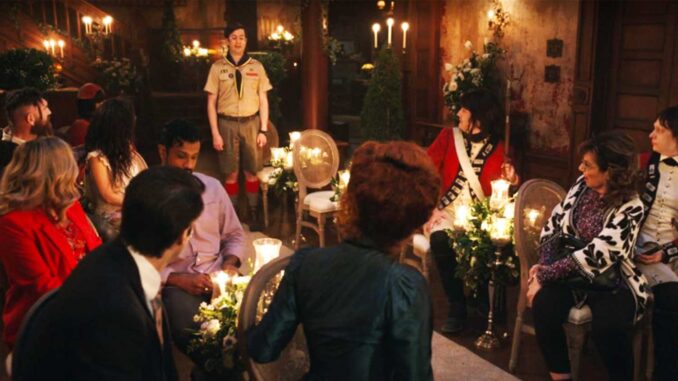
The Mystery of the Missing Mob: Why Ghosts Season 5 Must Confront the Basement's Unsung Story
"Ghosts" has charmed audiences with its quirky, historical hodgepodge of spirits trapped in Woodstone Manor. We've laughed with Hetty's repressed sexuality, empathized with Isaac's struggle for acceptance, and cringed at Trevor's pantless antics. But beneath the heartwarming comedy and clever writing, a nagging question remains, a thread of unanswered lore that season five simply must address: what exactly happened to the mob that supposedly died in the basement of Woodstone Manor?
The vague backstory, peppered across previous seasons, hints at a violent demise. A group of Prohibition-era gangsters met their end in the basement, but the details are frustratingly sparse. We see fleeting glimpses, ghostly echoes in the shadows, and hear the occasional rumbling of unseen activity. Yet, unlike the other ghosts, these supposed denizens of Woodstone’s lower level remain shrouded in mystery. This isn't just a missed opportunity; it's a glaring inconsistency in the show's carefully constructed world, a loose end that pulls at the threads of its carefully woven tapestry.
The discrepancy lies in the show's established rules for ghosthood. Each resident ghost possesses a distinct personality, a defining trait or unresolved issue that anchors them to Woodstone. We know why Flower remains blissfully unaware, why Sasappis is forever burdened by the expectations of his tribe, and even the specific circumstances of Alberta's poisoning. The mob, however, are presented as a monolithic, menacing presence, stripped of individual identity and compelling backstory. They are simply "the mob," a faceless threat relegated to the role of spooky sound effects.
This lack of nuance is a disservice to the potential richness the mob's story could bring to the show. Think about it: these were individuals, likely driven by desperation and the allure of wealth during a turbulent period in American history. They could have been pawns in a larger game, victims of betrayal, or even reluctant participants forced into a life of crime. Exploring these possibilities would not only enrich the show's historical depth but also provide opportunities for pathos and unexpected humor, as the other ghosts attempt to understand their modern sensibilities. Imagine Isaac, the Revolutionary War officer, grappling with the cutthroat capitalism of the 1920s, or Alberta, a jazz singer herself, finding a surprising connection with one of the gangsters.
Furthermore, the omission of the mob's individual stories weakens the emotional core of the series. “Ghosts” at its heart, is about finding connection and understanding, about learning to live with and accept the flaws of others. By reducing the mob to a collective threat, the show misses the chance to explore the complexities of their individual circumstances and ultimately, to extend the same empathy to them that it offers to its other spectral characters.
Addressing the mystery of the basement mob doesn't necessitate a dramatic plot shift. It could be as simple as a single episode dedicated to unearthing their story through a séance gone awry, a forgotten diary discovered in the attic, or even a newfound ability for Sam to communicate with the spirits individually. Imagine Sam, with her newfound ability to see and interact with ghosts, finally being able to break through the mob's collective facade and uncover their individual stories, their regrets, and their hopes. This could lead to a poignant moment of understanding and forgiveness, allowing them to finally find peace and move on, or even become more integrated members of the Woodstone family.
The refusal to delve into the mob's history is not just a missed opportunity; it risks undermining the show's core themes of empathy and understanding. By finally confronting this lingering mystery in season five, "Ghosts" can not only enrich its lore but also reaffirm its commitment to telling compelling, character-driven stories, ensuring that even the most menacing of specters have a chance to find their voice and, ultimately, their peace. The basement deserves more than just spooky sounds; it deserves a story, a history, and a chance for redemption, just like every other ghost trapped within the walls of Woodstone Manor.